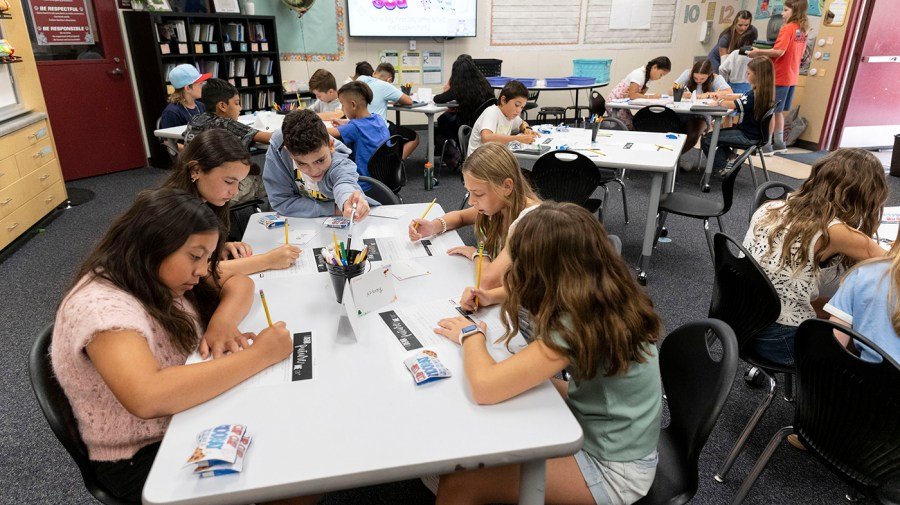
(NEXSTAR) — One could say the writing was on the wall six, seven weeks ago.
The slang that has found its way into nearly every conversation, every exchange of words, every response to any question in which children as young as elementary age are involved, has been declared the word of 2025 by Dictionary.com: “6-7.”
“The Word of the Year isn’t just about popular usage; it reveals the stories we tell about ourselves and how we’ve changed over the year,” the online wordbook explained in a Wednesday press release. “And for these reasons, Dictionary.com’s 2025 Word of the Year is 67.”
What does ‘6-7’ mean?
It’s not pronounced as sixty-seven, but rather six-seven. If you’ve spent any time around children or even young adults recently, you may have seen them lifting their hands, palms up, like they’re weighing options, while saying 6-7.
It does, of course, have its roots in online culture. Dictionary.com notes that 6-7 is having a massive year on Google Search as people — likely the parents, teachers, and elder figures surrounded by youth — try to figure out what it means.
We’ll spoil that for you now: It basically means nothing.
In his December 2024 song “Doot Doot (6 7),” Skrilla says, “6-7, I just bipped right on the highway.” The song — which was never meant to be released, Skrilla recently told the Los Angeles Times — was soon used during fan-made videos compiling clips of LaMelo Ball of the Charlotte Hornets. Coming in at an NBA average 6’7” tall, Ball has garnered a youth following thanks in part to the swag (to use a bit of retired slang) he brings on the court. The flashiness, Bleacher Report explains, appears to have contributed to the meme.
Ball isn’t necessarily well-known for his skills on the court, which have contributed to the belief that “6-7” and its “so-so” hand motion can be used to describe an average performance or situation.
“There’s literally no circumstance where a kid might not say, ‘six seven,” TikTok creator Mr. Lindsay has explained. In fact, there’s a chance your teens don’t even know why they’re saying it. Two teenagers questioned by Nexstar said so themselves.
You may have even heard 6-7 start to meld with other slang, like “sendy.” Another spoiler alert: the combination of the two again produces hardly any meaning.
Snubs for the 2025 Dictionary.com Word of the Year
Like any award, there are snubs that lost out to 6-7. Dictionary.com said there were 10 other words on its shortlist that were nearly crowned the word of 2025. You can decide if they’re more — or less — deserving:
- Agentic: As Dictionary.com explains, this has become associated with AI, describing “technologies that can perform tasks autonomously and make independent decisions.”
- Aura farming: This is another term rooted in social media and grew thanks to a viral meme of a child on a racing boat dancing.
- Broligarchy: This was, at times, used to describe the relationship between Elon Musk and President Trump earlier this year, but more broadly defines the perceived association of billionaire entrepreneurs.
- Clanker: Yet another word that has gained popularity thanks to AI that has frequently been used to mock it, as it may have been used to describe early, not-entirely-perfect robots.
- 🧨 dynamite emoji (TNT, Taylor ‘n’ Travis): The online dictionary says the dynamite emoji, or simply “TNT,” has been used to refer to the now-engaged Taylor Swift and Travis Kelce.
- Gen Z stare: Generally, this is referring to the perceived blank stares sometimes viewed across the younger generation, which experts say may more directly relate to how these digital natives have grown up.
- Kiss cam: An obvious nod to the viral kiss cam moment at a Coldplay concert earlier this year.
- Overtourism: This may be relatively self-explanatory, and the reason you’re looking for “detour destinations” for your next trip.
- Tariff: A frequent topic of conversation since President Trump took office.
- Tradwife: This shorthand for “traditional wife,” which already earned its place in the Cambridge Dictionary, refers to a married mother who cooks, cleans, and otherwise cares for the home and posts about it on social media.
Later this year, a Michigan university will release a list of “banished” words and phrases that it hopes we’ll all leave behind as we enter 2026. It may not come as a shock to anyone if “6-7” finds itself on that list, either.

